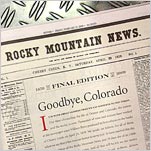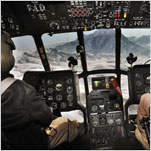WASHINGTON — President Obama won crucial backing on Thursday for his Iraq military withdrawal plan from leading Congressional Republicans, including Senator John McCain, the party’s presidential nominee, who spent much of last year debating the war with Mr. Obama.
As the president prepared to fly to Camp Lejeune, N.C., on Friday to announce that he would pull combat forces out by August 2010 while leaving behind a residual force of 35,000 to 50,000 troops, he reassured Congressional leaders from both parties that his plan would not jeopardize hard-won stability in Iraq.
But Republicans emerged from a meeting Thursday evening more supportive than several leading Democrats, who complained earlier in the day that the president was still leaving behind too many American forces.
Mr. McCain said during the private White House meeting that he thought the withdrawal plan was thoughtful and well prepared, according to several people who were in the room. His spokeswoman, Brooke Buchanan, confirmed by e-mail on Thursday night that Mr. McCain is “supportive of the plan.”
The convergence of Mr. Obama and Mr. McCain on Iraq would have seemed highly improbable just a few months ago, when they clashed harshly on the future of the American mission there. Mr. McCain accused Mr. Obama of being naïve and opposed his withdrawal plans. At one point, Mr. McCain said Mr. Obama “would rather lose a war than lose a campaign.”
Even since the inauguration, Mr. McCain, who represents Arizona, has remained a tough opponent of Mr. Obama, at least on economic matters. But the two have come to a common ground of sorts on Iraq, the issue that once defined their rivalry.
Mr. McCain’s views were echoed by other Republicans briefed in the State Dining Room by Mr. Obama, Defense Secretary Robert M. Gates and Adm. Mike Mullen, chairman of the Joint Chiefs of Staff. The Obama team told two dozen lawmakers from both parties that at least 90,000 of the 142,000 troops in Iraq would be withdrawn by August 2010 — 19 months after the president’s inauguration, or three months longer than the time frame he had outlined as a candidate.
Most withdrawals will take place next year to allow commanders to keep as many forces as possible through parliamentary elections in December. Mr. Gates and Admiral Mullen told the lawmakers that Gen. David H. Petraeus, the Middle East commander, and Gen. Ray Odierno, the Iraq commander, were comfortable with the plan, according to people in the room.
Representative John M. McHugh of New York, the ranking Republican on the House Armed Services Committee, said Mr. Obama had reassured him that he would revisit his plan if circumstances changed.
“The president’s objective to withdraw U.S. combat forces from Iraq is one that we should pray for, plan for and work toward,” Mr. McHugh said. “However, I remain concerned that the security situation in Iraq is fragile, and we should work to mitigate any risks to our troops and their mission.”
Representative John A. Boehner of Ohio, the House Republican leader, and other senior Republicans were likewise generally supportive, while advocating flexibility to preserve the security gains since President Bush sent more troops two years ago, according to Congressional aides.
But even before the session, Democrats criticized the size of the residual force, even though Mr. Obama said consistently during the campaign that he would leave troops behind to continue training Iraqi soldiers, hunting terrorists and protecting Americans in Iraq.
“I’m happy to listen to the secretary of defense and the president, but when they talk about 50,000, that’s a little higher number than I anticipated,” Senator Harry Reid of Nevada, the Senate majority leader, told reporters before heading to the White House. His spokesman said after the meeting that Mr. Reid still held those concerns.
Another person briefed on the session said Representative Nancy Pelosi of California, the House speaker, was particularly upset. She kicked off the public criticism on Wednesday by saying she did not understand “the justification” for 50,000 troops.
Senators Patty Murray of Washington State and Charles E. Schumer of New York echoed those sentiments on Thursday. “Fifty thousand is more than I would have thought,” Mr. Schumer said. “We await the justification for why that would be.”
But Senator Jack Reed, a Rhode Island Democrat who accompanied Mr. Obama to Iraq last summer, said a remaining force of 50,000 was appropriate. “It seems logical to me you would need a force of around that level,” he said in an interview. “The critical issue here is the missions that these troops are going to perform.”













